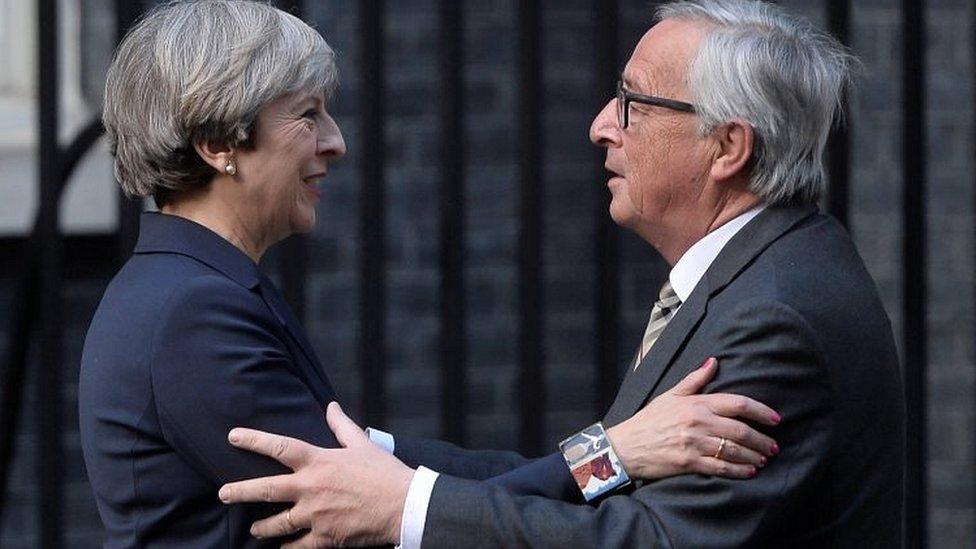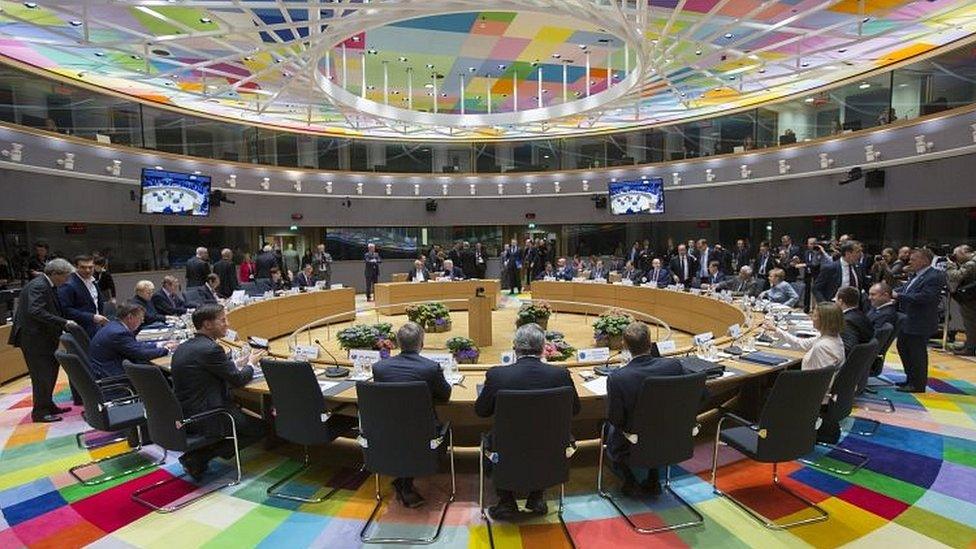Brexit: May says Juncker row claim is 'Brussels gossip'
- Published
Theresa May: "From what I have seen of this account, I think it's Brussels gossip"
Theresa May has dismissed as "Brussels gossip" an account of a dinner with EC President Jean-Claude Juncker, published in a German newspaper.
The pair reportedly clashed over Mrs May's desire to make Brexit "a success" and whether the issue of protecting the rights of expat UK and EU nationals could be agreed as early as June.
The Frankfurter Allgemeine, external claims Mr Juncker said: "I leave... 10 times more sceptical than I was before."
But Mrs May said it was "constructive".
And she told the BBC's Ben Wright: "I have to say from what I've seen of this account I think it's Brussels gossip."
Speaking during an election campaign event in Lancashire, she added: "Just look at what the European Commission themselves said immediately after the dinner took place, which was that the talks had been constructive."
The article said that, after last week's dinner, Mr Juncker was shocked at Mrs May's suggestion that a deal on citizens' rights could be achieved so quickly.
The German newspaper report also suggested Mr Juncker said there would be no trade deal between the UK and the rest of the EU if the UK failed to pay the "divorce" bill which it is expected to be asked for.
After bringing out paper copies of Croatia's deal to join the EU and the free trade deal recently signed with Canada to make his point, he said Brexit would be "very complex".
After the PM said she wanted to "make Brexit a success", the newspaper reported that Mr Juncker's response was: "Brexit cannot be a success. The more I hear, the more sceptical I become."
And when she said the UK owes no money to the EU, the president informed her that she was not leaving a "golf club".
The newspaper's Thomas Gutschker, who wrote the article, told BBC Radio 4's PM programme that EU officials "have an interest in conveying their sense of desperation after this dinner".
He added: "I don't think they have an interest in these talks collapsing. But they want to save the talks and they basically want to send a wake-up call to Downing Street."
'Different universes'
Jeremy Cliffe, the Berlin bureau chief for the Economist, raised the article on Twitter, posting 30 tweets outlining the dinner's highlights.
Speaking to BBC Radio 4's World at One, he said people should take the article "with a pinch of salt" as it had reportedly been leaked by only one side of the talks.
But he added that the Europeans and the British are "in totally different universes" when it comes to their expectations of Brexit negotiations.
"EU nationals... was the first example of several in which the expectations of the two sides seem to be utterly at odds," he said.
'Times will be tough'
The day after the meeting, Mr Juncker reportedly told German chancellor Angela Merkel that Mrs May was "deluding herself" and "living in another galaxy" when it came to the issue of Brexit talks.
Mrs May was asked about that quote during her interview on Sunday's Andrew Marr Show, and responded: "I'm not in a different galaxy. I think what this shows and what some of the other comments we've seen coming from other European leaders show is that there are going to be times when these negotiations are going to be tough.
"That's why you need strong and stable leadership in order to conduct those negotiations and get the best deal for Britain."

Things went downhill after a warm welcome, according to the leaks
The accounts of the dinner - which appear to have come from sources within the European Commission - have been seized upon by opposition parties in the UK.
Liberal Democrat leader Tim Farron said: "These reports have blown a massive hole in the Conservative Party's arguments. It's clear this government has no clue and is taking the country towards a disastrous hard Brexit.
"This election offers us a chance to change the direction of our country, keep Britain in the single market and give the people the final say over what happens next."
Labour leader Jeremy Corbyn said of Mrs May: "She seems to be sending rather mixed messages.
"To start negotiations by threatening to walk away with no deal and set up a low tax economy on the shores of Europe is not a very sensible way of approaching people with whom half of our trade is done at the present time."

Analysis: By BBC Europe correspondent Kevin Connolly

The EU set out tough terms for the Brexit negotiations at the weekend - and has followed up with a steady drumbeat of briefing suggesting that the UK is unprepared for the talks to come and harbouring delusions about the possible outcomes.
Officials in Brussels naturally have a vested interest in stressing that leaving the EU is difficult and dangerous - but there's enough detail in the descriptions of a difficult dinner in Downing Street last week to suggest that there are real problems alongside the tactical manoeuvrings.
The President of the European Commission, Jean-Claude Juncker, who was a guest of Theresa May, apparently told his host that the more he heard about the British position the more sceptical he was about the prospects of a deal.
British perceptions of the meal have not been leaked in the same level of detail but there's no doubt the European briefings will be seen in the UK as provocative - and designed to stir up fears among British voters about what Brexit is going to mean.
Read more from Kevin Connolly here.

